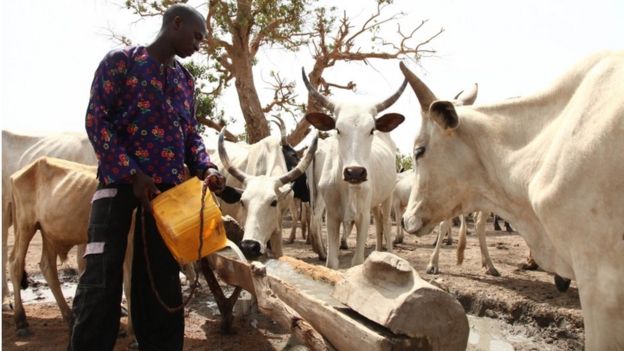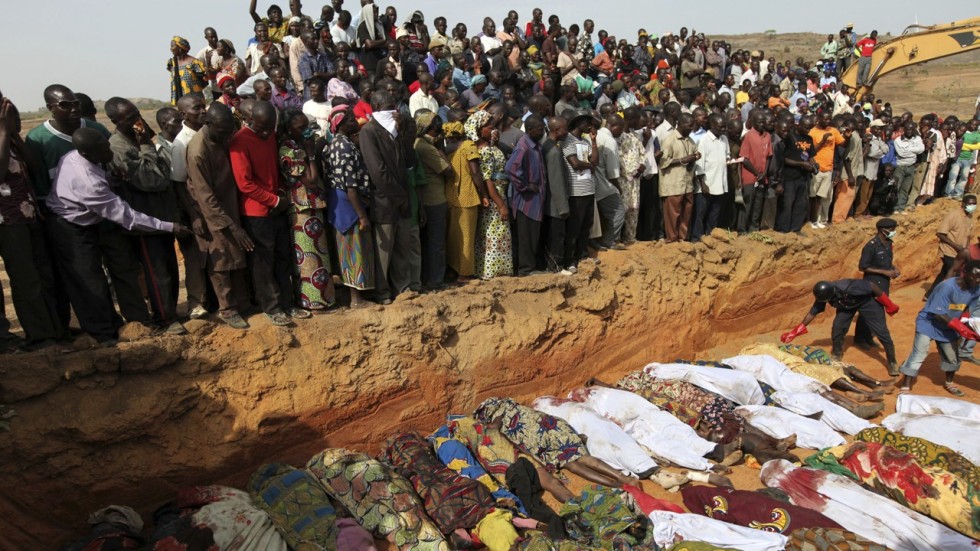Tribal, Sectarian Africa's Conflicts
"Nigerians in their thousands have been gruesomely dispatched to the Great Beyond by armed Fulani herdsmen who are being protected by the powers that be."
Emmanuel Onwukibo, coordinator, Human Rights Writers' Association of Nigeria
"The reverend fathers [Christian priests killed along with parishioners during Mass] were not farmers."
"The armed herdsmen have moved the narrative of the current crisis from search for grass to other obvious motives [promoting Islam through jihad to the detriment of Christianity]."
Christian Governor Samuel Ortom, Benue State
"[President Muhammadu Buhari is running out of time to convince Christians that a] grand mischievous plan for territorial conquest, ethnic cleansing and religious imposition] by Muslim Fulanis is not in the works]."
"The very survival of our nation is now at stake."
Catholic Archbishop of Abuja John Onaiyekan, Abuja, Nigeria
 |
| A Fulani herdsman waters his cattle (file picture)AFP/GettyImages |
And though Nigeria is one of those rare African countries with great natural resources and has considerable income from petroleum, there isn't much of a trickle-down effect to ensure that the country's wealth is equally shared. There are, throughout Africa, droughts impacting on agriculture and cattle-raising, and since the two enterprises are diametrically opposed, there is great tension between the herdsmen wanting to graze their herds, and the agriculturalists who want their fields unmolested.
Climate change has impacted Africa, bringing stress and deadly hostility between herdsmen and agriculturalists to the fore in South Sudan and the Central African Republic. Muslims and Christians have turned against one another in confrontations for that very same reason in Nigeria. Armed cattle herders, Muslims of the Fulani tribe, have raised militias in Nigeria, just as has occurred in northern Kenya where farmers both white and black have been killed.
In Nigeria, hundreds of thousands of people have vacated farms and villages, leaving their homes to abandonment. Where crops are not being raised, hunger, economic collapse and disease spreading in camps for the displaced looms on the near horizon. Aggression on the part of semi-nomadic cattle herders from the Fulani ethnic group, some 20 million in number, their territory spread across west and central Africa, threatens stability.
Traditional pasturage in the north of Nigeria has collapsed as it has elsewhere in some northern African states where up to 75 percent of grassland has been transformed through desertification. Water sources have been disappearing alongside attacks by Boko Harm to combine circumstances thrusting the Fulani and their herds into the fertile central farmlands of Nigeria; the Middle Belt, home to a Christian majority population.
Local authorities and farmers' attempts to protect crops and farmland has resulted in reprisals where farmers tending their crops have had their hands severed, stuffed into their pockets as examples meant to terrify other farmers to abandon their fields. Fulani gangs on motorcycles attack villages and the terrorized inhabitants flee as the gangs open fire, set fire to homes, hack children to death. In a village in Kaduna state last month 71 people were killed.
Even some Fulani have been slaughtered by their fellow tribesmen in this battle between agriculture and herding. But it's not solely herders involved in these attacks. Young gangs of Fulani have organized kidnapping camps in the vast Rugu forest, emerging on their motorcycles to prey on pedestrians walking isolated nearby pathways. As many as a hundred people were kidnapped in two days last month in Kaduna state.
One attack on a church in Benue state in April saw two priests and 17 of their parishioners killed during Mass, persuading many Christian Nigerians that the real intention of the Fulanis is to dispossess them through territorial acquisition and the expansion of Islam through ethnic cleansing of Christians. The result has been that Christian tribesmen felt compelled to form armed vigilante groups to battle the herders during attacks, and to implement reprisal attacks themselves.
Muslim President Muhammadu Buhari, accused of turning a blind eye to the attacks has ordered the military to restore order. Nigeria's armed forces have been dispatched to do just that, finding their opponents in possession of arms superior to their own, the very situation that prevailed when they went out to rout Boko Haram terrorists.
 |
Nigeria: 86 dead in reprisal attack by Muslim herders on Christian farmers The long-running battle for land and resources is threatening to become the worst security risk in Nigeria 25 June 2018, South China Post |
Labels: Boko Haram, Cattle, Christians, Conflict, Farmers, Islamists, Muslims, Nigeria

<< Home